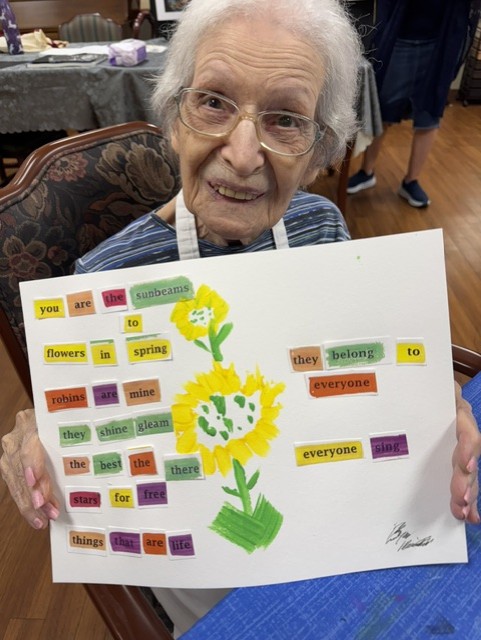Good death. Isn’t that an oxymoron? Can death ever be good? When I asked a fellow pastor, he said, “Absolutely not. Death is the opposite of life; it’s an enemy.” That’s true. When my grandmother went into the hospital for a routine procedure on her heart, the doctor accidently pierced her heart. Afterward, she had a stroke, so my family quickly gathered around her to support her. Filled with shock over these unexpected events and the reality of her dying, death felt like a thief stealing her final years. At her funeral, I couldn’t stop crying because my grief was so fresh.
But now as a chaplain in a retirement community, I have experienced residents dying peacefully and families comforted with opportunities to say “I love you” and “goodbye.” At times, residents’ dying moments feel sacred and peaceful to family and staff bearing witness in their final hours.
Is death good? No. But sometimes people can die well. So rather than using the terminology of a “good death,” I prefer “dying well.” Dying is part of each of our lives. As Dame Cicily Saunders, the founder of the modern hospice movement, says, “You matter because of who you are. You matter to the last moment of your life, and we will do all we can, not only to help you die peacefully, but also to live until you die.”
Because of Dr. Ira Byock’s experiences treating dying patients who experienced profound peace and wellness in their final days, he advocates a developmental model lens by which to view dying: it’s part of the human life-cycle.
“We speak of growing up and growing old; perhaps we can refer to those who emerge from suffering into a subjective sense of wellness in their dying as ‘growing on'” (“The Nature of Suffering and the Nature of Opportunity at the End of Life,” Clinics in Geriatric Medicine, Vol 12, No. 2, pp 237-252, May 1996).
One of the chief tasks of “growing on” is to make sense of one’s own suffering and dying. Lillian, another resident under hospice care, told me, “I don’t mind my suffering because I got to meet my great-grandchild.” For some, the hope of reuniting with loved ones helps them accept the suffering of dying.
Bill was admitted to Pilgrim Manor when his Alzheimer’s disease became so debilitating his wife could no longer care for him at home. Bill was angry with his family. He wanted to move back to Florida and live with his wife, and he couldn’t remember he had Alzheimer’s, nor could he recognize his own impairment. Even though Bill emotionally suffered a life he couldn’t understand, his faith in God’s love and care spiritually sustained him. One night, Bill told his roommate, “I’m going to die tonight.” His roommate protested, thinking Bill was in despair. Instead, Bill told him, “No, I’m not despairing. I’ve made my peace with God, and I’m ready to go.” That night, he died in his sleep. Making peace is an important element in dying well.
Making peace is deeply personal and individual. For some, it might include making peace with God or other spiritual realities. For others, making peace is about family and setting relationships in order.
When Frank was admitted under hospice care, he appeared distant and distressed. As we built a relationship, he finally admitted he had committed a crime that still weighed heavy on his heart. It had also cost him his relationship with his son. I suggested he write his son a letter, expressing his regret and asking for forgiveness. He couldn’t physically write anymore, so Frank dictated his letter to me. I typed it, he signed his name and Frank sent off the letter with anxious hope. His son responded, and they made peace in person. Frank’s whole demeanor changed to an almost expectant hopefulness in the face of his death. He was also able to finally forgive himself and his relief was palpable. Frank died well.
As pastors and chaplains, we can support people with our attentive listening. Often, allowing people to tell their stories helps them make meaning of their life, like it did for Frank. As death nears, many people also want to bless their families with final words. I’ve used Dr Ira Byock’s “saying of five things” to help residents say good-bye: “Forgive me.” “I forgive you.” “Thank you.” “I love you.” “Goodbye.” (“The Nature of Suffering and the Nature of Opportunity at the End of Life,” Clinics in Geriatric Medicine, Vol 12, No. 2, pp 237-252, May 1996). These simple words often help family and friends say their final goodbyes. This kind of closure brings tears, even laughter, as well peace and relief. One resident told me, “All right. I’ve said what I need to. Now I’m ready to die.”
Dr Lucy Kalanthi writes in When Breath Becomes Air, “A gift we get to have in medicine is to be witnesses. It’s a front row seat to the human condition.” So too is it a gift of working with older adults who face dying and death. I am eternally grateful to the many residents who have shown me the ways of living well and dying well.
View all articles by:





















